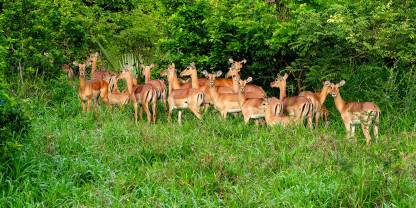Gorongosa National Park was once one of Africa’s finest wildlife destinations. Sadly, it was abandoned and depleted of animals during the civil war. Despite many setbacks, big efforts have been made to rehabilitate Gorongosa. Today, although far from fully recovered, the park is once again a great safari destination. One that is far away from any crowds.

-
Best Time To Go
- July to October (Dry bush, animals are easy to find)
-
High Season
- June to October (The park never gets busy)
-
Size
- 4,067km² / 1,570mi²
-
Altitude
-
18-307m /59-1,007ft
 View Photos
View Photos
 View Photos
+24
Photos
View Photos
+24
Photos
Pros & Cons
- Good wildlife viewing and superb birding
- Off-the-beaten-track destination
- A chance to support a great conservation effort
- Community development projects and village visits
- as well as walking, boat and canoe safaris
- Only one lodge in the park, at the entrance, with little bush appeal
- Ongoing political unrest in the area
- Self-drive is not allowed at present for security reasons
Wildlife
You’ll be taken on game drives in an open safari vehicle. Your guide is likely to show you elephants and lions and a big variety of antelope such as waterbuck, nyala, bushbuck, greater kudu and maybe even sable. Buffalo are harder to spot. If you take a boat trip on Lake Urema, you’ll see plenty of hippos and monstrous crocodiles as well as a wealth of waterbirds.
More about Gorongosa’s wildlifeScenery
Situated at the very end of Africa’s Great Rift Valley, Gorongosa has a large variety of landscapes. These include Lake Urema and its network of rivers; vast floodplains, savannahs and woodlands; and rainforest on Mt Gorongosa. A hike to Morumbodzi Falls on the mountain is a great addition to a safari.
Activities
All activities at Gorongosa are guided. Self-drive is currently not allowed. A is always a nice change from the usual in open safari vehicles. Also, don’t miss out on a boat safari on Lake Urema, or a scenic canoe trip with morning coffee or drinks on the Pungué River. Furthermore, you can visit the local communities on a cycling trip or spend a full day exploring Mt Gorongosa. If you’re a birder, you might want to go on a birding adventure with a specialized guide.
Weather & Climate
The climate in Gorongosa is hot and tropical. The Dry season (May to October) is cooler than the Wet season (November to April), although temperatures start rising in September. The wettest months are from November to March, when afternoon showers can be expected most days
More about the weather and climateBest Time To Visit
The best time for wildlife viewing is during the middle and end of the Dry season, from July to October. Conditions improve as it gets drier, when animals stay around water sources that haven’t dried up. Wildlife tends to disperse during the Wet season (November to April) and travel conditions can be difficult at this time. In fact, the park closes from mid-December to the end of March.
More about the best time to visit
